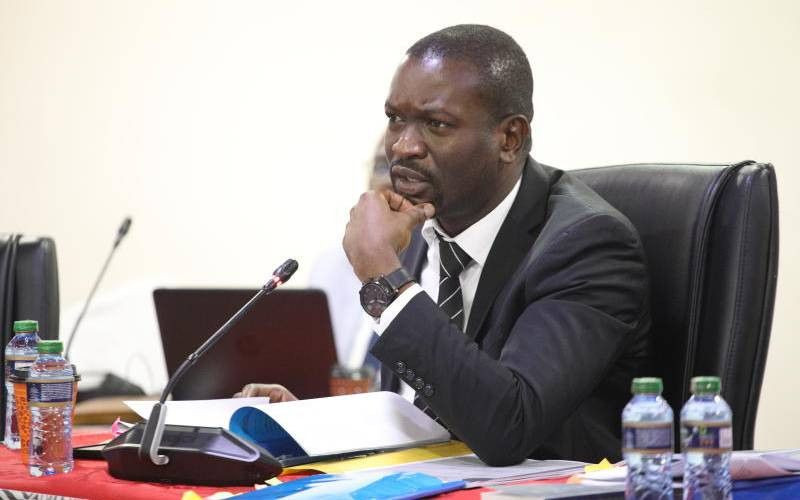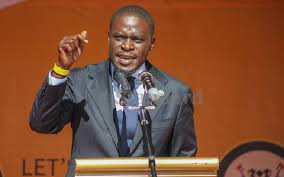Mr. Namwamba made a name for himself during the tenth parliament. At that time he was what most people would call greenhorn, just entering parliament, but with a lot of heat in his trail. His contributions to the debate in the national assembly were outstanding. He spoke many times, but I do not have the statistics, so I would not say how many times.
But Namwamba was not alone during that time. There were other sober debaters, the likes of Gitobu Imanyara, Charles Kilonzo, John Mbadi, Boni Khalwale. And then there was the speaker of the national assembly, Kenneth Marende and his deputy, Farah Maalim. During those times they managed to debate on a number of very difficult issues affecting the country. Speaker Marende and deputy Maalim were forced, on many occasions, to make very difficult decisions on behalf of parliament and on behalf of the country.
But people still liked them because they made good decisions. Even those who were not favored by their rulings had some compassionate words for him; people begun to say that he had Solomonic wisdom. During those times, percentage viewership for live parliamentary proceedings could compete favorably against, or out compete the many soap operas and Nigerian movies on TV. Even on radio, it was easy to tune out of a sex-laced topic in a particular station into streaming proceedings live from parliament.
In those days, people remembered specific dates when certain rulings were to be made by Marende, Maalim and company, and they made sure they tuned in to listen to it. In those days, again, ODM party had the tyranny of numbers. That is how they produced both speaker and his deputy. ODM as a party also had many reservations against their counterpart: PNU. But it didn’t matter anyway. Speaker Marende and deputy Maalim found a way of capturing the heart and spirit of many Kenyans. They might have gotten away with one or two partisan, ill-advised rulings, but overall people were at home with their leadership.
And so if one was to compare then and now, then you begin to understand why Ahmednassir Abdullahi and many other Kenyans feel letdown by Muturi. You then begin to understand why they may choose to use words like ‘incompetent’ and ‘killed’ to describe him and his leadership. To best illustrate this, we still have live parliamentary proceedings on both TV and radio, but people now consider them boring to watch and listen to. Now, thanks to Muturi and his team, we have gone back to soap operas and Nigerian movies.
May be the speaker’s sub-minimal performance has also affected some parliamentarians. In the current parliament, Ababu has been active, but unlike the previous parliament when he was serving his first term. Maybe he has run out of energy he once had. Maybe he has run out of good ideas which he can share with the rest of the country. So he has relocated to a small village in the Western Kenya, and resorted to what people may call village politics.
When it all started, Pius Ababu Namwamba told us he was championing for the Mulembe awakening, from the Mulembe nation. But now it does not seem so. Mulembe nation has become bigger. Namwamba now wants to play at a much lower league than that.
Prior to becoming the champion for Mulembe nation, Namwamba was least amused when he was called a Jubillee mole by some of his former colleagues in ODM, and accused of rocking ODM from within. And he had all the rights to feel so, because mole is not a nice name to call your comrade. But things have changed slightly.
Namwamba now sees things clearly. He has seen some evil hands behind former speaker Marende’s declaring his interest in the Nairobi’s gubernatorial seat. He believes that Mr. Marende has no interest in winning the seat, but rather to spoil the chances of Eugene Wamalwa. He has vowed that they will shame him and teach him a political lesson. It is not known who ‘they’ in this context are. It is also not known if Ababu speaks for or on behalf of the Mulembe nation or for the section of Jubille Alliance Party (JAP) members who support Eugine’s candidature.
Never mind that some very big hands have been accused of pushing Eugene Wamalwa to run for the governor’s post in Nairobi. Never mind the fact that besides riding on the ‘Wamalwa’ name, which he was fortunate enough to inherit from his late brother and former vice president, Michael Kijana Wamalwa, there is no measurable contribution to Kenya, either political or otherwise, that can be attributed to Eugene Wamalwa.
Ababu therefore has no right, either on behalf of Luhyas or Nairobians, to reprimand Marende over his interest for Nairobi governorship. Both Wamalwa and Marende have had diverse opportunities in the past to define their characters in leadership and public service.
The truth is, just like Namwamba, Marende made a name for himself during the Kibaki-Raila Grand Coalition government. In fact during the tail-end of the Grand Coalition, Marende was among the people Kenyans had assumed would run for presidency. He owes nobody an apology if he chose to ride on that name.
Eugene Wamalwa on the other hand currently serves as a Cabinet Secretary, CS. But he cannot even respect the constitutional provisions that require a CS to remain politically neutral. At the end of his term as the CS, he may probably have nothing to show for the years he spent in his docket. He is therefore least deserving of the Nairobi governor’s position than Marende.
 The Standard Group Plc is a
multi-media organization with investments in media platforms spanning newspaper
print operations, television, radio broadcasting, digital and online services. The
Standard Group is recognized as a leading multi-media house in Kenya with a key
influence in matters of national and international interest.
The Standard Group Plc is a
multi-media organization with investments in media platforms spanning newspaper
print operations, television, radio broadcasting, digital and online services. The
Standard Group is recognized as a leading multi-media house in Kenya with a key
influence in matters of national and international interest.
 The Standard Group Plc is a
multi-media organization with investments in media platforms spanning newspaper
print operations, television, radio broadcasting, digital and online services. The
Standard Group is recognized as a leading multi-media house in Kenya with a key
influence in matters of national and international interest.
The Standard Group Plc is a
multi-media organization with investments in media platforms spanning newspaper
print operations, television, radio broadcasting, digital and online services. The
Standard Group is recognized as a leading multi-media house in Kenya with a key
influence in matters of national and international interest.









